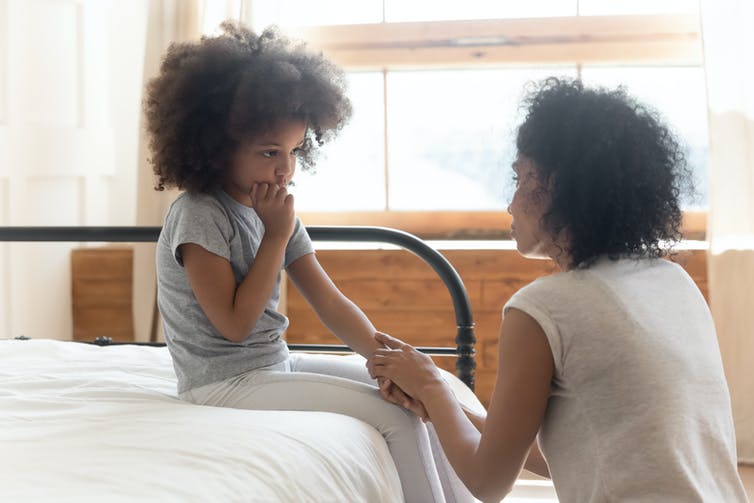
Many survivors of sexual violence have spoken out in public through social media movements such as #MeToo and, in Québec, via “Dis Son Nom,” since 2017.
These movements have allowed society to hear the voices of survivors. They have also drawn attention to a common phenomenon that has long been kept in the shadows.
Although we can only applaud women for speaking out, and the positive impact their actions have had in various domains — such as sports, culture and post-secondary education — these initiatives exclude children who are the victims of sexual violence.
Child victims of sexual abuse, particularly those of preschool age, are poorly represented in research on the impact of this trauma. Most studies explore the consequences of sexual violence in adults.
As professors at McGill University and the Université du Québec à Montréal, we have spent decades studying the social and emotional development of preschool children who have been sexually abused, and documenting the impact of sexual abuse on children and adolescents.
Table of Contents
One in five victims never discloses the abuse
A 2009 study of adults from Québec revealed that 22.1 per cent of women and 9.7 per cent of men had been victims of sexual abuse — rape or unwanted touching — before they had reached the age of 18. Furthermore, 16.3 per cent of them were under the age of six the first time they were molested and 45.5 per cent were school-aged children.
Unfortunately, these young victims have no voice in the public sphere and hardly any at home. The act of disclosing sexual abuse is fraught with risks, both for adults and children. The Québec study showed that one in five had never disclosed their sexual abuse to anyone and that one in two disclosed it more than five years after the abuse.

(Shutterstock)
Young people face many barriers in disclosing sexual abuse. These may include having less developed language and cognitive abilities (especially for preschoolers), being close to the abuser (often a family member or someone the child depends on), a limited social network outside the family, shame and fear of not being believed, or fear of the negative repercussions of disclosure.
But studies to date reveal that young children can provide accurate details of the sexual abuse they have experienced when they are questioned properly. In Québec, police investigation practices for collecting testimonies from young victims have improved. This is thanks to the work of Mireille Cyr, a professor in psychology department at the Université de Montréal, and her team, and the training offered on the National Institute of Child Health and Human Development protocol, an approach to retrieving informative and accurate accounts of incidents from young people.
Multiple impacts
Our research over the past 15 years has allowed us to see the difficulties young children face. In particular, young children who have been sexually abused are at greater risk than other children of developing what’s known as internalizing (anxiety, depression, social withdrawal) and externalizing (aggression, unruly behaviour, opposition) behaviour problems.
They are also at greater risk of sleep problems and symptoms of pathological dissociation, such as a feeling of detachment from oneself or one’s environment, sudden mood swings and an inability to remember events.
At the heart of these difficulties are two fundamental developmental processes that are impaired by early sexual abuse, namely the ability to form healthy attachment (secure versus insecure attachment) and to self-regulate emotions.
These early impacts trigger severe behavioural difficulties. In addition to their inability to regulate their emotions and form healthy attachments to others, children may experience difficulties at school, poorer social skills and ultimately academic failure. They also experience social isolation and re-victimization in the form of peer bullying or teenage dating violence.
In short, sexual abuse at a young age is likely to have long-term effects.
There are solutions
Fortunately, these negative cascades can be avoided by using effective techniques that help young victims of sexual abuse resolve their trauma and become resilient.
For example, trauma-focused cognitive behavioural therapy, combined or not with attachment-focused interventions, has been shown to be effective with sexually abused preschoolers.
Preventing such violence should obviously be a priority. There are various initiatives in post-secondary settings that aim to raise community awareness about sexual violence.
The return of sex education to secondary and primary schools in Québec is a welcome change. However, earlier intervention will be needed to put an end to the problem of sexual violence. Education to prevent sexual violence in young children has been used since 2019, thanks to the Lantern program offered by the Marie-Vincent Foundation.
Sexual violence can only be prevented through early education about sexuality, egalitarian relationships and fighting against sexual stereotypes.
Parents, child-care workers and anyone who works with young children can all play a crucial role in preventing sexual abuse and helping to create a society where children do not have to fear being abused or exploited.
![]()
Rachel Langevin has received funding from the Social Sciences and Humanities Research Council of Canada and the Fonds de recherche du Québec – Société et culture.
Martine Hébert has received funding from the Canadian Institutes of Health Research and the Canada Research Chairs Program.























